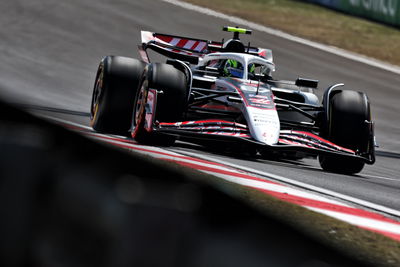'I was wrong', Martin Whitmarsh admits

McLaren team principal Martin Whitmarsh admitted on Monday that his call to tell Lewis Hamilton to stop out on track at the Circuit de Catalunya at the end of the third round of qualifying for the Spanish Grand Prix was a big mistake.
"I took the call ... I was wrong," said Whitmarsh. "I didn't anticipate as a consequence of that we would be starting from back of the grid."
Whitmarsh said that it was his lack of full understanding of the FIA rules concerning fuel that had caused the misstep, and that he should have taken another approach to limit the damage once the discovery had been made that Hamilton had been sent out with insufficient fuel.
"With hindsight I could have called it a different way, and he could have just come in at the end of the out lap," he said. "Frankly, I didn't expect the penalty we did see."
Whitmarsh pointed out that the situation was less clear in the short space of time that the team had to make their decision.
"It's difficult to measure fuel on board so you never know if it's right or wrong," he said. "The data indicated that there was not as much fuel on board as we thought."
Whitmarsh knew there was a strict rule that there had to be a litre of fuel remaining in the car at the end of the session for technical inspection, and made his decision to stop Hamilton on that basis.
However, the team then ran foul of a technical directive that had been issued by race director during the 2012 Canadian Grand Prix weekend, which said that any car that came to a premature stop on its in-lap after during qualifying would be required to explain the reasons why to the satisfaction of the race stewards to ensure that it had not been done done deliberately to gain a competitive advantage.
With that guidance less black-and-white than the strict rules over technical inspection, Whitmarsh opted to comply with the rules and argue the apparently grey areas of the directive with the officials later.
"Whatever the outcome I was going to be embarrassed," he added, but he agreed that: "We must make sure that we're right."
If Hamilton had returned to pit road before putting in his final lap, then he would have had the necessary fuel on board to pass the FIA inspection. He would have ended up losing pole position to Pastor Maldonado, and Fernando Alonso would still have started the Barcelona race in second place.
But Hamilton would still have have started from the second row rather than from the back, and been in an excellent position to take advantage of the McLaren's clearly superior pace that was proven in the race.
"I'm so proud with how composed he was, how well he dealt with it," added Whitmarsh, impressed with how Hamilton had fought back from the grid using a two-stop strategy to finish in the points in eighth place.
"He got himself into the points and could have got a few more," said Whitmarsh. "It was an extraordinary drive, extraordinary self control, discipline, maturity from him."
Hamilton said after the race that he hoped his tyre management at Spain would help lay to rest the unfavourable comparisons between his driving style and that of his team mate Jenson Button.
"People always say how aggressive my driving style is compared to my team mate but I think I proved them all wrong in the race," he said. "I was surprised myself, when I was moving through the field, that the options lasted so long.
"I was one of the only ones to do a two-stop strategy and people always comment how aggressive my driving style is," he continued. "I hope today I could prove them wrong.
"I don't know if I had a lot to prove. I think maybe today was just a reassurance," he added.











